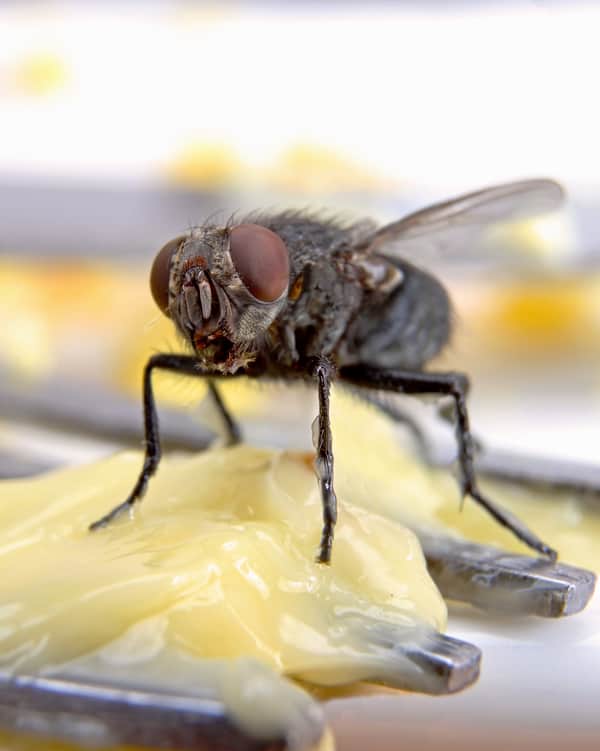Annoying. Pesky. Irritating. Filthy. Gross. Disgusting. These are just some of the words that people often used to describe flies.

In any business setting, flies are a nuisance at best and a potential health hazard at worst. Flies can spoil a business’s reputation, particularly in the restaurant, food processing and hospitality industries. What can businesses do to help solve and prevent frustrating fly problems?
Understanding What Attracts Flies
First, it’s important to understand what attracts flies. There are thousands of fly species in the world, including the house fly, little house fly, blow flies, flesh or latrine flies, fruit flies and stable flies. Stable flies – commonly found where livestock are present – bite while many other species are merely nuisance flies. Flies are strongly attracted to light, food odors or other “favorites” and can enter your business through doors and windows, and can live in drains and thrive on trash receptacles.
Many people object to flies because they think they are unsanitary and for good reason. According to the World Health Organization, flies are capable of spreading disease because they feed on human food and filthy matter, picking up and transmitting disease-causing organisms along the way when they make contact with people or their food.
Fruit flies can be especially bothersome for businesses. As their name implies, this species often breeds in ripe or rotting fruit, especially bananas, and in garbage and recycling bins. Fruit flies are often confused with other flies, but they can also be confused with gnats. Fruit flies are brown insects with red eyes. Fungus gnats are tiny, black insects with long wings and spindly legs.
To help get rid of fruit flies, find and discard items (in outdoor trash receptacles) on which the flies are breeding. Keep trash cans clean of debris build-up and make sure no fruit or other food materials have fallen behind equipment or have otherwise been missed by cleaning crews. Make sure fresh fruit is stored properly and that old fruit is discarded promptly.
To help get rid of other fly species, here are some tips:
- Remove their breeding grounds by properly cleaning, maintaining and emptying outdoor garbage receptacles and by removing animal waste that may be attracting flies. Locate dumpsters at least 100 feet from food concessions if possible.
- Properly seal cracks in walls or flooring where flies may be entering, and have your entry points, like doors and windows, closed or properly protected with screens or air curtains
- Keep food covered and stored properly.
- Keep drains and grease traps clean and free of debris.
- Consider having fans strategically installed to help keep flies at bay.
Related: How to Control Spiders on Your Commercial Property
Contact a Commercial Pest Control Company
However, for better fly control results, contact a commercial pest control company, like Terminix Commercial, for help.
Terminix Commercial takes a proactive approach to fly control to help ensure that these pests don’t become an issue in the first place. Instead of simply removing current offenders, Terminix Commercial will use a variety of methods at key points to help keep future invasions under control. With customized fly control systems, businesses can notice an immediate reduction in fly activity. Terminix Commercial also advises clients on sanitation methods to help deter flies, as well as other effective control methods.
Terminix Commercial fly control solutions may include drain fly removal and ultraviolet Insect Light Traps (ILTs) that can be wall mounted, ceiling mounted, free standing, or designed as decorative wall sconces. Terminix Commercial pest control professionals work with each individual business to establish solutions based on space and specific fly issues.
Don’t let flies adversely impact your reputation and revenue. Take steps to help prevent and control flies before your business gets a bad buzz.
Related: How to Identify Wasp Nests Outside Your Business

